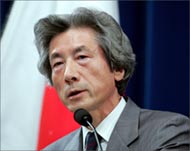Japan slips into recession
Japan has fallen into its fourth recession in a decade as the economy shrank 0.1% in the last three months of 2004 on lacklustre exports and weak consumption, but most economists expect a rebound in coming months.

The drop in gross domestic product (GDP) for the October-December period from the preceding quarter marked three straight quarters of contraction and went against a consensus market forecast for 0.1% growth in real or price adjusted terms.
A downward revision of July-September figures to a 0.3% contraction from an initial reading of 0.1% growth meant the economy had met the common definition of recession – two quarters of contraction.
Tokyo’s economy also contracted 0.2% in the April-June quarter.
“There are three quarters now of negative growth, so Japan is really struggling in this recovery,” said Paul Sheard, chief economist at Lehman Brothers Japan.
|
“The results came in at the lower end of expectations, but we shouldn’t be too pessimistic” |
On an annualised basis, GDP in the world’s second-largest economy shrank a real 0.5% in the last three months of 2004, worse than a median market forecast of 0.5% growth, government data showed on Wednesday.
The yen sagged and the Tokyo stock market opened lower after the GDP data, but the stock market’s downside was capped as the data showed healthy growth in capital spending, which rose 0.7% – the third straight quarter of gains but below the market’s forecast for a 1.2% jump.
Outlook
The Nikkei share price average ended 0.38% lower at 11,601.68, but briefly touched its highest intraday level in more than seven months.
The yen was hovering around 105.15 to the US dollar at 0930 GMT compared with 104.45 before the data.
“The results came in at the lower end of expectations, but we shouldn’t be too pessimistic about the current state and the outlook for the economy,” said Naoki Iizuka, senior economist at Dai-ichi Life Research Institute.
Iizuka and other economists expect GDP for January-March to rebound as consumption is expected to pick up on better income and job conditions.
 |
|
Prime Minister Junichiro Koizumi |
They also cited a recent boost in machinery orders as a positive sign of future corporate investment.
The outlook for 2005 hinges on an expected recovery in global economies, a waning in the strength of the yen, which hit a five-year high last month against the dollar, and brisk corporate activity spreading to household spending.
Prime Minister Junichiro Koizumi maintained the government’s view that the recovery remained intact in the bigger scheme of things, although the pause was protracted, a view shared by Economic Minister Heizo Takenaka.
Economic recovery
“Basically, the economic recovery is continuing. It’s just that consolidation is being protracted,” Koizumi said.
Japanese companies, which are reporting record profits, appear to support this view and many are investing heavily.
“For us, November, December and January have been bottom months. Things have been getting a little better in February and volume is likely to grow substantially in March,” Yukio Sakamoto, chief executive of chip maker Elpida Memory said last week.
 |
|
Private-sector consumption |
Elpida, like many other Japanese firms, has embarked on a huge investment programme in anticipation of a recovery in demand.
For calendar 2004, the economy grew 2.6% – its fastest pace since 1996 thanks to a roaring start to the year, helped by special demand for televisions and DVD players before the Olympic games.
But as the year progressed, slowing exports and inventory adjustments in the information technology sector dampened economic activity.
Growth rate comparison
Japan‘s annual growth rate compares with preliminary readings for 2% growth in the euro zone, which also started the year quickly, but slowed to just 0.2% growth in the fourth quarter, and a 4.4% expansion in the United States.
Private-sector consumption, which accounts for 55% of the economy, fell 0.3% in October-December, as typhoons and earthquakes kept shoppers at home.
External demand, or exports minus imports, clipped 0.2 percentage points off growth – the second straight quarter in which external demand dragged down growth.
Although exports account for only 10% of Japan‘s economic activity, they had been a key engine of the recovery over the last few years because they fuelled industrial output and capital spending.
Data earlier this week showed Japan‘s trade surplus grew 16.7% in 2004, thanks to a booming economy in China, which overtook the US as Japan‘s biggest trading partner.